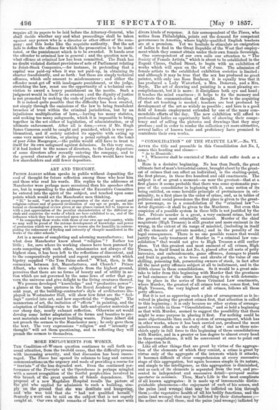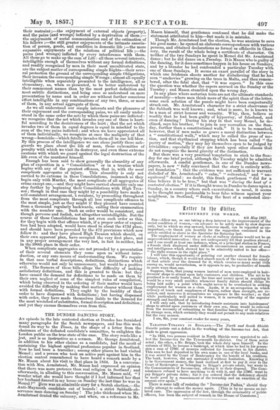MORE EMPLOYMENTS FOR WOMEN.
TILE Condition-of-Women question continues to call forth unusual attention, from the twofold cause, that the difficulty presses with increasing severity, and that discussion has been encouraged. The Times has opened its columns to long and earnest communications on the urgency and mode of providing a rescue for " traviate" of the less degraded sort. Even the continued performance of the Trariata at the Operahouse is perhaps mingled with a covert recognition of the fearful perplexities involved in this branch of the great question of female dependence. The proposal of a new Magdalen Hospital recalls the picture of the girl -who applied for admission to such a building, simply-on the ground that she was destitute and hungering, aud who was told that she "had not qualified herself." Scarcely a word can be said on the subject-that is not eagerly caught at. Our own slight remarks of last week have met vritti divers kinds of response. A fair correspondent of the Times, who writes from Philadelphia, points out the demand for competent governesses in America, where highly-qualified English teachers Y
are at a premium. et we hesitate to stimulate an emigration of ladies to find in the Great Republic of the West that employment which they cannot obtain under their own female Sovereign. One correspondent of our own calls our attention to "The Society of Female Artists," which is about to be established in the Regent Circus Oxford Street, to begin with an exhibition of
works which Circus, open on the 1st of June. The admission of female artists to the established exhibition societies is limited ; and although it may be true that the sex has produced no great painter, with only one Rosa Bonheur, it is equally true that it has produced a Lady Waterford, a Mrs. Donovan, and a Mrs. Boyle. The art of drawing and painting is a most pleasing accomplishment, but it is more : it disciplines both eye and hand ; it teaches the mind exactness ; it helps to fix the memory and illustrate the communication of thought. Now to the acquiring of that art teaching is needed teachers are best produced by development of the art as widely as possible ; and here is a good field of female employment extended by one of the many commendable efforts of the day. The new exhibition will afford to professional ladies an opportunity both of showing their competency and of selling the pictures and drawings that they may produce ; and in order to render the collection yet more attractive, several ladies of known taste and proficiency have promised to contribute their own works.
" CONSOLIDATION " OF THE STATUTE LAW.—No. VI. AFTER the title and preamble in this Consolidation Act No. I, comes this heading and clause " As to Homicide : "I. Whosoever shell be convicted of Murder shall suffer death as a felon."
Here is a decisive-beginning. No less than Death, the great ultimate fact of man's terrestrial career, brought about by the greatest of crimes that can affect an individual, is the starting-point, the first phrase, in these five hundred and odd enactments. The subject is of so great a moment—so near the greatest—that at a first glance it seems probable that there was some systematic purpose of the consolidator in beginning with it, some notion of its being entitled, on some heraldic principle of preeminence in criminality, to a first place in the order of crime, and, as in tables of political and social precedence the first place is given to the greatest personage, so in a consolidation of the criminal law ' — detur digniori—it shall be given to the Murderer. But even this suspicion of a possible system in these bills is not justified by the fact. Private murder is a great, a very' eminent crime, but not the greatest or most criminally eminent. Murder of the chief magistrate (High Treason) is still greater and more eminent in its wrong, in the extent of its range of mischief, (including in itself all the elements of private murder,) and in the penality of its legal consequences. There is no one possible reason that would justify the early treatment of Murder in " a criminal law consolidation" that would not give to High Treason a still earlier place. Yet this greatest and most eminent of all crimes, High Treason, is itself found in Act No. 5, placed after all sorts of petty larcenies, and embezzlements, game offences, damages to plants and fruit in gardens or to trees and shrubs of the value of one shilling, poisoning fish, personating owners of stock, in fact after all the most petty offences subject at all to indictment, and in the 219th clause in these consolidations. So it would be a great mistake to infer from this beginning with Murder that the greatness or bad eminence of the crime has anything to do with determining its place in the series of these Criminal Law enactments, where Murder, the greatest of all crimes but one, comes first, but High Treason, the very highest of all crimes, follows all these petty offences. But it is not as approving such a plan of arrangement as is involved in placing the greatest crimes first, that attention is called to this beginning ; it is only because no other system of arrangement is visible in these "Consolidations," and so bold a beginning as that with Murder, seemed to suggest the possibility that there might be some purpose in placing it first. For nothing could be more objectionable than such a system of arrangement, which has in other works where it has been carried out, produced the most mischievous effects on the study of the law : and as these mischiefs apply in full force to this beginning of these consolidations with Murder, and in a greater or less degree to almost every head in these compilations, it will be convenient at once to point out the objection to it. Like all other things that are great by virtue of the aggrega'tion of the elements of which they consist, a crime is great by 'virtue only of the aggregate of the interests which it attacks, it becomes difficult of clear oomprehensien at every successive stage of this aggregation, but again becomes simple in its nature, and simple to the intelligence, as this aggregation is diminished, and as each of its elements is separated from the rest, and presented in independent and successive detail--quicquid melius spectntur in minimis. Thus, Man's Life is the most complicate of all known aggregates : it is made up of innumerable distinguishable phenomena—the enjoyment of each of his senses, and the pains tind wrongs) that may be inflicted on him through them ;—the vegetative health of all his bodily functions, and the pains (and wrongs) that may be inflicted by their disturbance ;— the active use of all these, and the pains (and wrongs) inflicted by their restraint;—the enjoyment of external objects (property), and the pains (and wrongs) inflicted by a deprivation of them;—. the enjoyments of social communication and of the estimation of his fellows ;—the still greater enjoyments of the intimate association of person, goods, and condition in domestic life ;—the more expansive enjoyments of the relations of political life ;—the pains (and wrongs) inflicted by every interference with them. All those go to make up the sum of Life : all these several interests, intelligible enough of themselves without any formal definitions, and readily recognized by men in their most uncultivated state, are the subject matter of corresponding simple Rights—their several protection the ground of the corresponding simple Obligations, their invasion the corresponding simple Wrongs ; almost all equally intelligible when separately presented to the intelligence, all so elementary, as, when so presented, to be better understood by their commonest names than by the most perfect definition and most subtile distinctions, and being once so understood on mere presentation by name and in order are without further conscious effort intelligible in any combinations of any two, three, or more of them, in any actual aggregate of them.
As we all understand our simple interests and the pleasures of their enjoyment and the corresponding pains, we all easily understand in the same order the acts by which these pains are inflicted : we recognize that the act which invades any one of these is hurtful according to the decisiveness of the hurt ; that the act which invades two of them in equal degrees is equal in mischief to the sum of the two pains inflicted; and when we have appreciated all of them individually, we recognize at once the malignity of that wrong—homicide—which fatally invades them all in one fell blow. By this process of the intelligence we can alone justify those safeguards we place about the life of man, those extremities of penalty with which we visit its destroyer, and even those extreme cautions with which we guard against the legal destruction of the life even of the murderer himself.
Enough has been said to show generally the absurdity of any plan of exposition in a " Consolidation " or in a treatise which begins with any of the greatest offences, that is, with the most complicate aggregates of injury. This absurdity is only not carried to its extreme in these Consolidations, inasmuch as they begin only with Murder, the most complicate of all aggregates of crime except one,—and they might have carried absurdity only one step further by beginning their Consolidations with High Treason; though in that case they might 1)3r a possibility have made a self-consistent arrangement, a reculons, by proceeding throughout from the most complicate through all less complicate offences to the most simple, just as they might if they pleased have counted from a thousand regularly backwards, ending their enumeration with the number one. Such an order would be consistent, and though perverse and foolish, not altogether unintelligible. But the course of these Consolidations has not even such order as this, for they begin with that offence which, if a proper order of exposition had been adopted, would have stood in about the 473d place, and should have been preceded by the 472 provisions which now follow it: and they have placed High Treason which should, on their own apparent plan, have occupied the very first place, and in any proper arrangement the very last, in fact in neither, but in the 390th place in their order.
When complicate aggregates arc not preceded by a presentation of their several elements they come upon us without introduction, or any sure means of understanding them. We require in that case verbal descriptions, definitions, distinctions which otherwise would not only be unnecessary, but would be a positive evil. The framers of these bills allege the difficulty of making satisfactory definitions, and this is granted to them : but they have caused the demand for definitions to be made on them by their own neglect of some of the simplest rules of compilation, which being observed in the ordering of their matter would have avoided the difficulty by making that matter clearer without than with formal definitions. They ought by the lucidity of their order to have dispensed with definitions ; but having dispensed with order, they have made themselves liable to the demand for the most wretched of substitutes, formal description and definition ; and yet they excuse themselves even from this.



























 Previous page
Previous page